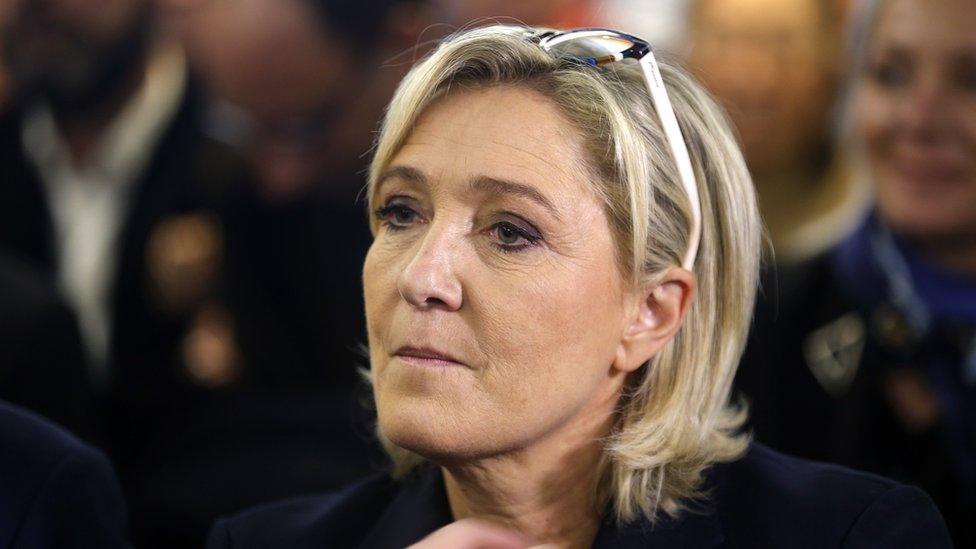Marine Le Pen: Who's funding France's far right?
- Published
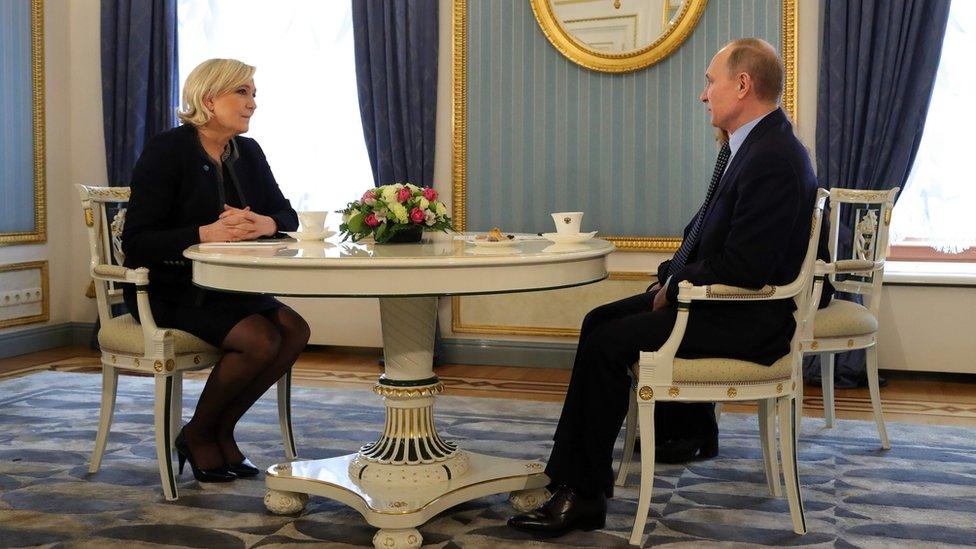
Marine Le Pen says she has met Vladimir Putin only once, but is that true?
When Marine Le Pen appeared in the Kremlin on 24 March, it was Vladimir Putin himself who gave voice to the thought that was surely on many people's minds:
"I know that the presidential campaign is developing actively in France," the Russian president said, adding: "Of course, we do not want to influence events in any way."
The Russian president appeared to be suppressing a grin as he spoke those words. Marine Le Pen appeared unperturbed.
She repeated her support for Moscow's annexation of Crimea, and her opposition to the sanctions subsequently imposed by the EU. If elected to the Elysee Palace, she pledged: "I would envisage lifting the sanctions quite quickly."
So the meeting was a win for both. Madame Le Pen looked like a world-leader-in-waiting; Mr Putin received assurances from a woman who might become president of France, and who, like him, opposes the EU and Nato.
'Mr Mission Impossible'
But there is more to the relationship between Mr Putin and Ms Le Pen than ideological convergence. Because of the National Front's racist and anti-Semitic past, French banks have declined to lend the party money.
So Marine Le Pen has been forced to look elsewhere for financing.
In 2014, the National Front took Russian loans worth €11m (£9.4m). One of the loans, for €9m, came from a small bank, First Czech Russian Bank, with links to the Kremlin.
The loan was brokered by Jean-Luc Schaffhauser, an energy consultant turned MEP, who has called himself "Mr Mission Impossible".
When I met him in Strasbourg, he told me he initially secured an agreement with a financial institution in Abu Dhabi, but the deal fell through. He even approached a potential lender in Iran, but Marine Le Pen vetoed the idea, he said. Eventually, he went to Russia.
The negotiations over the loan coincided with Russia's annexation of Crimea. EU governments condemned the annexation. Marine Le Pen publicly took the opposite view, leading some to question whether the loans were a quid-pro-quo.
Mr Schaffhauser denied he and Ms Le Pen ever discussed the issue of Crimea in relation to the loan.
"Always Marine Le Pen, and Jean-Marie before, was for co-operation with Russia," he said. "It was not a political loan. It was a commercial loan."
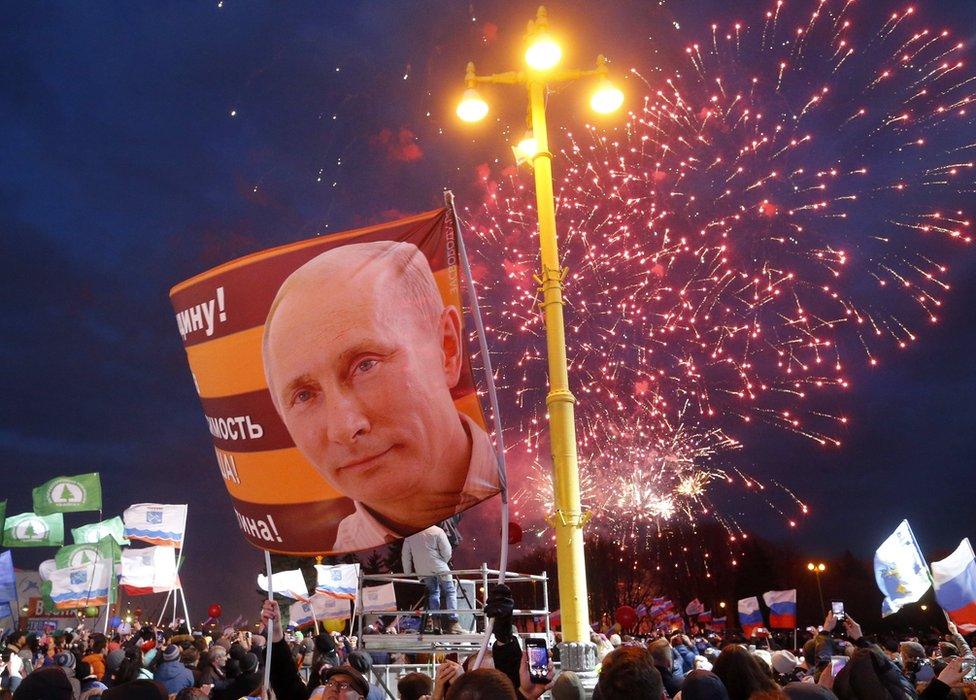
Celebrations were recently held in Moscow to mark three years since the annexation of Crimea
But Russia did want to use Ms Le Pen to legitimise its actions in Crimea. We know this because a group of Russian hackers, known as Shaltai Boltai, or Humpty Dumpty, published a series of text messages said to be between a Kremlin official and a Russian MP.
The exchanges, which took place in mid-March 2014, shows the pair discussing the possibility of Marine Le Pen travelling to Crimea as an observer in the referendum which would lead to Crimea's annexation.
"We really need this, I told my boss you were in contact with her," the Kremlin official says.
Marine Le Pen didn't go to Crimea. Instead she publicly backed the results of the referendum, a fact that delighted the Kremlin official and the MP.
"She didn't let us down," says one text, followed by a smiley-face.
"We must find some way of demonstrating our respect to the French," comes the reply.
Some believe the €9m loan, which was made later that year, was indeed a reward for Ms Le Pen's support over Crimea.
"For me, there is no doubt that [the loan] was authorised by Kremlin," said Mikhail Kasyanov, who was prime minister under Vladimir Putin before he joined the opposition.
"[It was] a special operation, a special recommendation of those businesspeople, to help Marine Le Pen."


The Kremlin told me it had nothing to do with the loans, and that Mr Putin and Marine Le Pen had never met before the visit to Moscow in March 2017. Marine Le Pen echoed that.
But I heard something different, and from a pretty good source.
In February, I met Marine's father, Jean-Marie Le Pen, founder of the National Front, at his mansion on the outskirts of Paris. On his desk, he showed me a glossy calendar depicting Vladimir Putin in various military poses.
"I see, that's your friend," I joked.
"He's not my friend," he said, "I've never met him. But he's met Marine."
Mr Le Pen was unclear about the exact details of the meeting. But this conversation took place before the public meeting in the Kremlin in March.
Marine Le Pen's supporters in Nantes say why they are backing her
Jean-Marie Le Pen and his daughter are not on good terms. She expelled him from the National Front in 2015 in an attempt to distance herself from his racist, anti-Semitic reputation.
But other people close to Marine Le Pen also told me that she had claimed to have met Mr Putin previously. Somebody is lying. But who? And why?
When I asked Jean-Luc Schaffhauser about the earlier meeting he said simply:
"This is a secret. There are little secrets, and this secret."
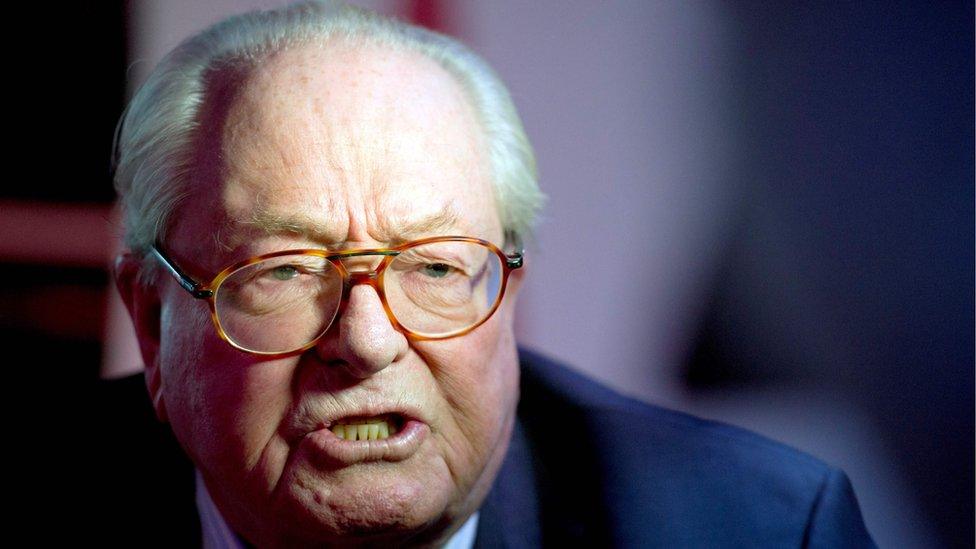
Jean-Marie Le Pen told the BBC in February that his daughter had met Vladimir Putin, but this was before a Moscow meeting said to be their first
Marine Le Pen maintains she has never been influenced by Russian money. But last week it was revealed the National Front had applied for another Russian loan in 2016.
Amid fears over Russian interference in elections from Europe to the United States, the mystery of her relationship with Vladimir Putin casts a shadow over her campaign.
Marine Le Pen: Who's Funding France's Far Right? is on BBC One at 20:30, Monday, April 3. If you miss it, you can catch up later online.
- Published31 March 2017
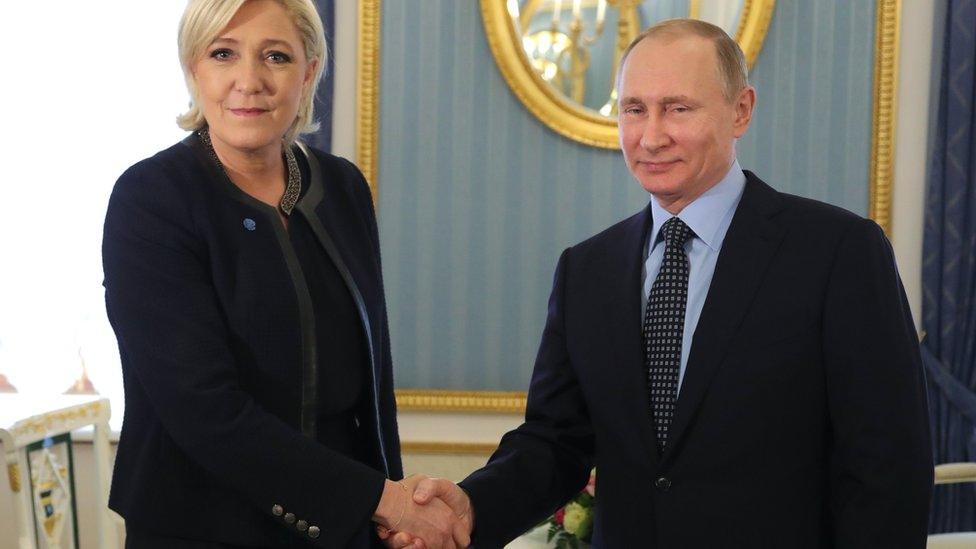
- Published24 March 2017
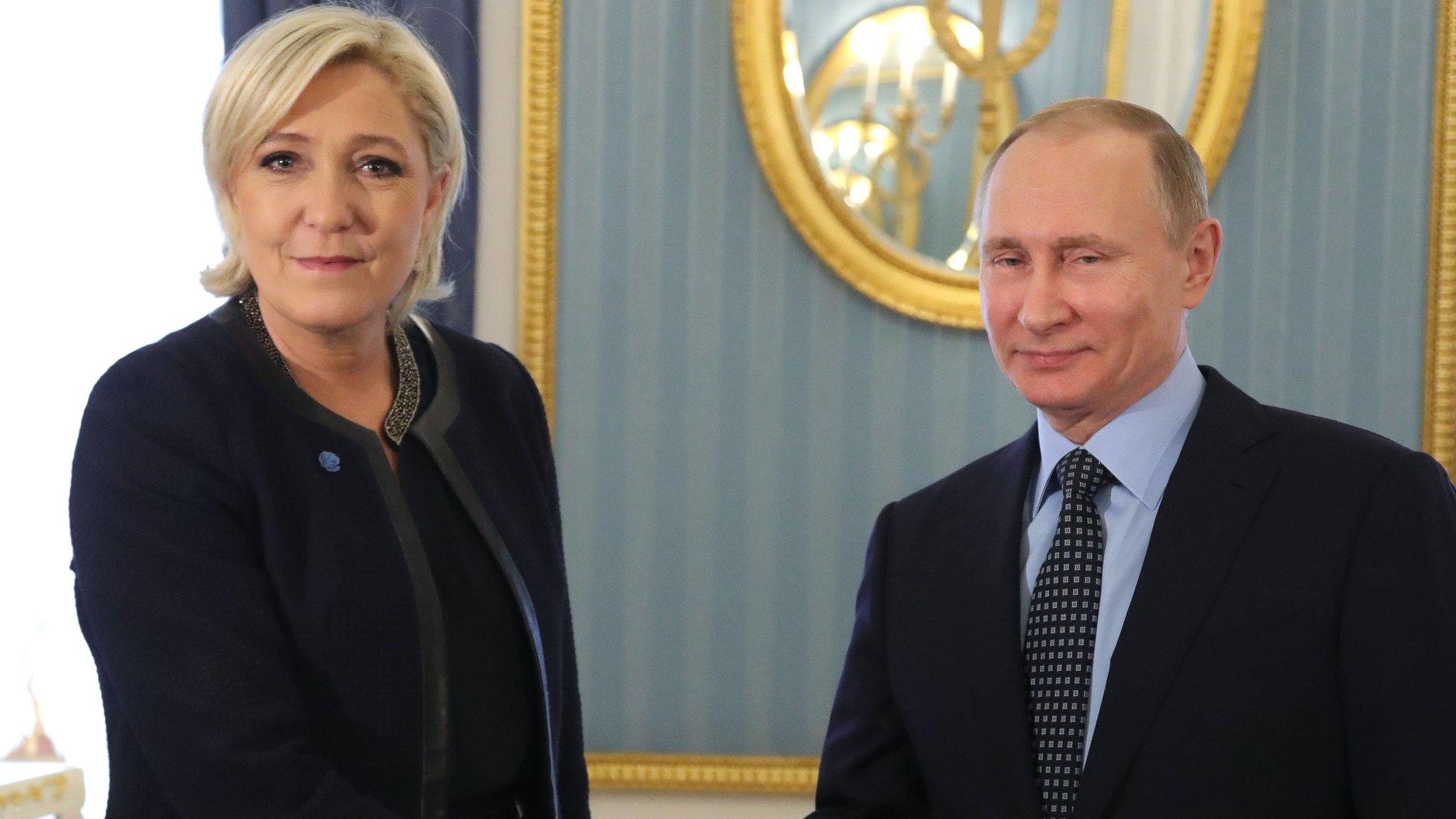
- Published24 April 2017
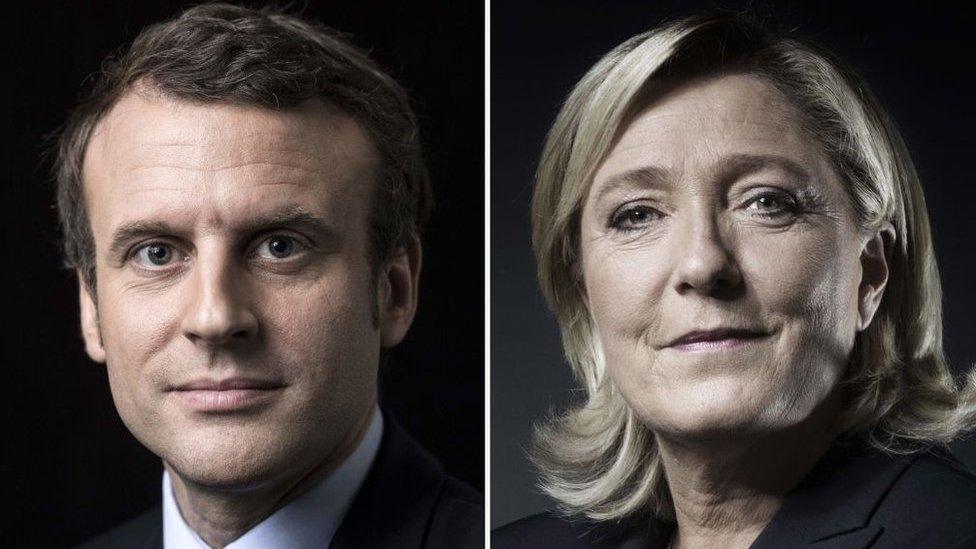
- Published27 February 2017
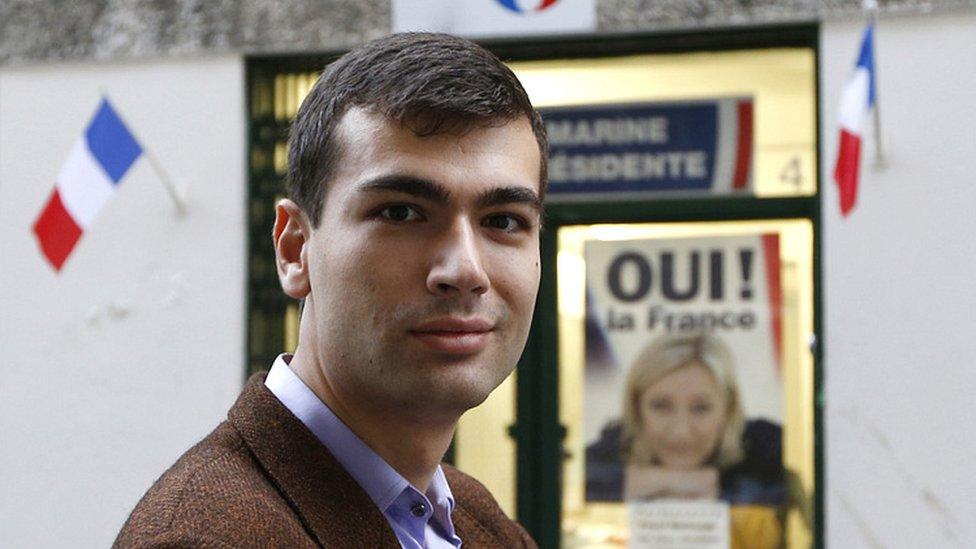
- Published12 September 2016
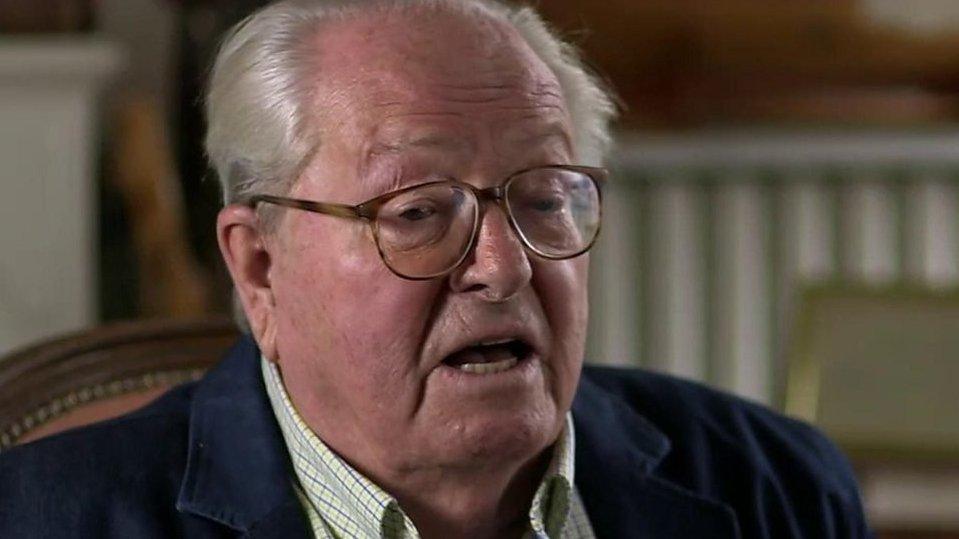
- Published10 February 2017
